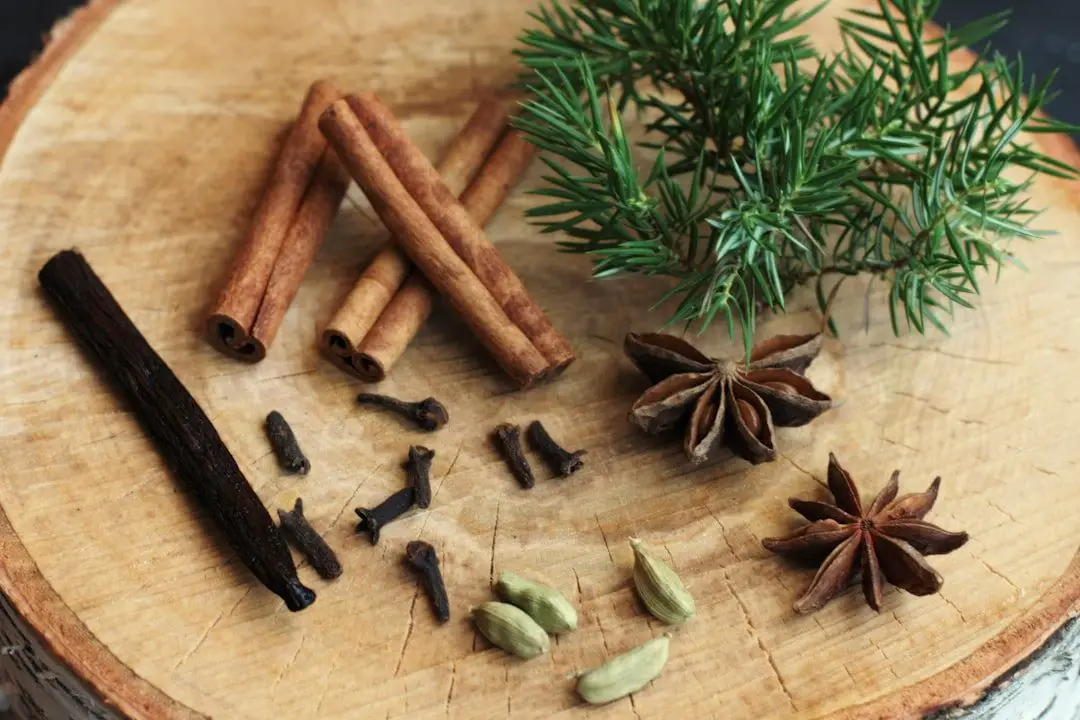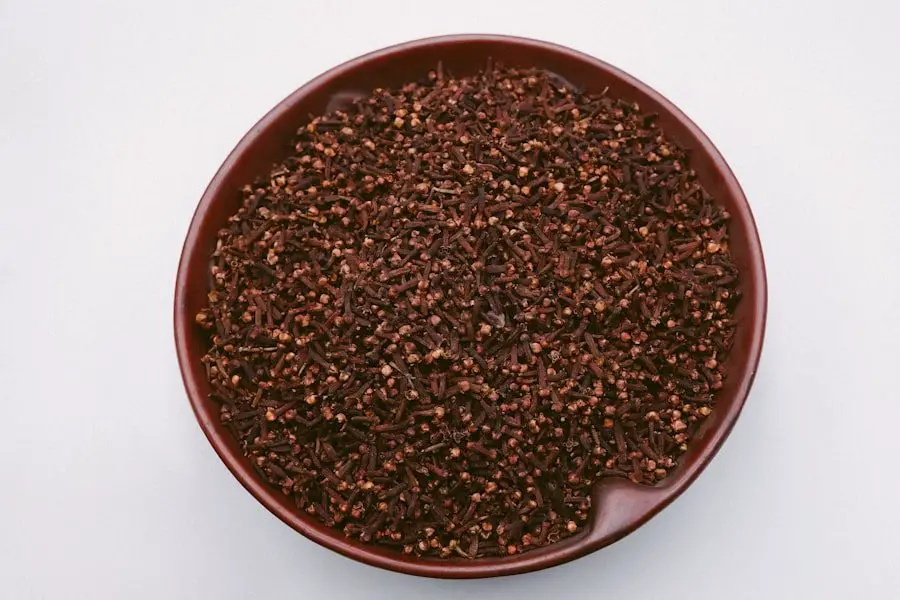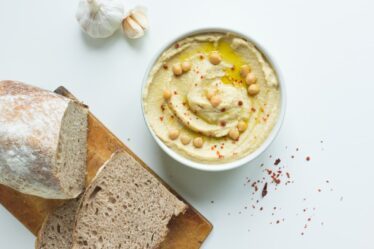
Cloves are a spice that have captivated people for centuries with their unique flavor and aroma. In this article, we will delve into the fascinating history, nutritional value, medicinal properties, culinary uses, aromatic qualities, different forms, best pairings, health benefits of clove oil, cultural significance, and future potential of cloves. By exploring these aspects of cloves, we can gain a deeper understanding and appreciation for this versatile spice.
Perplexity and burstiness are two concepts that are often used to describe the characteristics of language. Perplexity refers to the measure of how well a language model predicts the next word in a sequence of words. It is a way to quantify how surprised or confused a language model is when it encounters a new word or phrase. Burstiness, on the other hand, refers to the tendency of certain words or phrases to occur in clusters or bursts within a text. These concepts can be applied to the study of cloves as well, as they have a rich history and a wide range of uses that can be both surprising and clustered.
Key Takeaways
- Cloves have a rich heritage and have been used for centuries in various cultures.
- Cloves are a powerhouse of antioxidants and minerals, making them a nutritious addition to any diet.
- Cloves have medicinal properties and can be used as a natural remedy for various ailments.
- Cloves are a versatile spice that can be used in both savory and sweet dishes.
- Cloves have a fragrant aroma that can enhance the flavor of any dish.
The History and Origin of Cloves: A Spice with a Rich Heritage
Cloves have their origins in Indonesia, specifically in the Maluku Islands, also known as the Spice Islands. These islands were once the only source of cloves in the world, making them highly valuable and sought after. The spice trade played a significant role in the exploration and colonization of various parts of the world, with cloves being one of the most prized commodities.
Cloves made their way to other parts of the world through various means. Arab traders were among the first to introduce cloves to Europe and other regions. They kept the origin of cloves a closely guarded secret for centuries, which only added to their allure and value. Eventually, European explorers such as Vasco da Gama and Christopher Columbus discovered the source of cloves and established direct trade routes with the Spice Islands.
In ancient cultures, cloves held great significance and were used in various rituals and traditions. They were believed to have medicinal properties and were used to treat ailments such as toothaches, digestive issues, and respiratory problems. Cloves were also used in religious ceremonies and as offerings to gods and spirits. Their strong aroma was thought to ward off evil spirits and bring good luck.
The Nutritional Value of Cloves: A Powerhouse of Antioxidants and Minerals
Cloves are not only prized for their flavor and aroma but also for their impressive nutritional value. They are rich in vitamins and minerals, making them a powerhouse of antioxidants and essential nutrients.
Cloves are a good source of vitamins such as vitamin C, vitamin K, vitamin E, and various B vitamins. These vitamins play a crucial role in maintaining overall health and supporting various bodily functions. Vitamin C, in particular, is known for its immune-boosting properties and its ability to fight off free radicals that can cause oxidative stress.
In addition to vitamins, cloves are also packed with minerals such as manganese, iron, calcium, and magnesium. These minerals are essential for maintaining healthy bones, supporting muscle function, regulating blood pressure, and promoting overall well-being.
One of the most notable aspects of cloves is their high antioxidant content. Antioxidants are compounds that help protect the body against damage caused by free radicals. Free radicals are unstable molecules that can cause oxidative stress and contribute to the development of chronic diseases such as heart disease, cancer, and diabetes. Cloves contain a compound called eugenol, which is a potent antioxidant that has been shown to have anti-inflammatory and antimicrobial properties.
The Medicinal Properties of Cloves: A Natural Remedy for Various Ailments
| Ailment | Medicinal Property |
|---|---|
| Toothache | Clove oil has analgesic properties that can help relieve toothache pain |
| Cough and Cold | Cloves have antiseptic and expectorant properties that can help relieve cough and cold symptoms |
| Headache | Clove oil has anti-inflammatory properties that can help relieve headache pain |
| Arthritis | Cloves have anti-inflammatory properties that can help relieve arthritis pain and inflammation |
| Digestive Issues | Cloves have carminative properties that can help relieve digestive issues such as bloating, gas, and nausea |
Cloves have long been used in traditional medicine for their medicinal properties. They have been found to have anti-inflammatory, pain-relieving, and digestive benefits.
The anti-inflammatory properties of cloves can help reduce inflammation in the body and alleviate symptoms associated with conditions such as arthritis, rheumatism, and inflammatory bowel disease. Cloves contain compounds that inhibit the production of inflammatory enzymes and cytokines, which are responsible for triggering inflammation.
Cloves are also known for their pain-relieving effects. They have been used for centuries to alleviate toothaches and other types of pain. Clove oil, in particular, is often used topically to numb the affected area and provide temporary relief from pain.
In addition to their anti-inflammatory and pain-relieving properties, cloves may also have benefits for digestive health. They have been used to treat various digestive issues such as indigestion, bloating, and nausea. Cloves contain compounds that can help stimulate the production of digestive enzymes and improve digestion.
The Culinary Uses of Cloves: A Versatile Spice for Savory and Sweet Dishes
Cloves are a versatile spice that can be used in a wide range of culinary creations. They add a unique flavor profile to both savory and sweet dishes, making them a popular choice among chefs and home cooks alike.
In savory dishes, cloves are often used in stews, curries, and marinades. They add a warm, aromatic flavor that complements the richness of meats and vegetables. Cloves can be used whole or ground, depending on the desired intensity of flavor. When using whole cloves, it is important to remove them before serving as they can be quite strong if bitten into directly.
In sweet dishes, cloves are commonly used in baking. They pair well with ingredients such as cinnamon, nutmeg, and ginger to create delicious treats such as cakes, pies, and cookies. Cloves can be ground or used whole in sweet dishes, depending on the desired texture and intensity of flavor.
The unique flavor profile of cloves is often described as warm, sweet, and slightly spicy. It adds depth and complexity to dishes, making them more interesting and flavorful. Cloves can be used in moderation to enhance the overall taste of a dish without overpowering other flavors.
The Aromatic Qualities of Cloves: A Fragrant Addition to Your Kitchen

One of the most distinctive qualities of cloves is their strong, aromatic scent. The aroma of cloves is often described as warm, spicy, and slightly sweet. It can instantly transport you to a cozy kitchen or a bustling spice market.
The strong aroma of cloves makes them a popular choice for aromatherapy and home remedies. Clove oil is often used in diffusers or added to bathwater to create a relaxing and invigorating atmosphere. The scent of cloves is believed to have mood-enhancing properties and can help reduce stress and anxiety.
In addition to their use in aromatherapy, cloves can also be used to freshen up your home. Simply simmer a few cloves in a pot of water with other aromatic ingredients such as cinnamon sticks, orange peels, and star anise. This will create a fragrant steam that will fill your home with a warm and inviting scent.
The Different Forms of Cloves: Whole, Ground, or Oil, Which One to Use?
Cloves are available in different forms, each with its own advantages and disadvantages. The three main forms of cloves are whole cloves, ground cloves, and clove oil.
Whole cloves are the dried flower buds of the clove tree. They are small, dark brown in color, and have a hard texture. Whole cloves have a strong flavor and aroma that can be quite intense if used in excess. They are often used in recipes that require long cooking times, as they release their flavor slowly.
Ground cloves are made by grinding whole cloves into a fine powder. Ground cloves have a more concentrated flavor and aroma compared to whole cloves. They are often used in recipes that require a quick burst of flavor, such as baked goods and spice blends. Ground cloves should be stored in an airtight container to preserve their freshness and flavor.
Clove oil is extracted from the buds and stems of the clove tree. It is highly concentrated and should be used sparingly. Clove oil is often used in topical applications for its pain-relieving and antimicrobial properties. It can be diluted with a carrier oil such as coconut oil or olive oil before use.
When choosing the right form of cloves for your needs, consider the recipe or application you will be using them for. Whole cloves are best for long cooking times, ground cloves are ideal for quick bursts of flavor, and clove oil is suitable for topical applications.
The Best Pairings for Cloves: Spices and Ingredients That Complement Its Flavor
Cloves pair well with a variety of spices and ingredients, creating a harmonious blend of flavors. Some of the best pairings for cloves include cinnamon, nutmeg, ginger, cardamom, allspice, and citrus fruits.
Cinnamon and cloves are often used together in both sweet and savory dishes. The warm, spicy flavors of cinnamon complement the aromatic qualities of cloves, creating a delightful combination. This pairing is commonly found in dishes such as mulled wine, spiced tea, and apple pie.
Nutmeg and cloves also work well together, especially in sweet dishes such as pumpkin pie and gingerbread cookies. The earthy, slightly sweet flavor of nutmeg enhances the warm, spicy notes of cloves.
Ginger and cloves are a classic pairing in many cuisines around the world. The zesty, slightly spicy flavor of ginger complements the aromatic qualities of cloves, creating a dynamic flavor profile. This pairing can be found in dishes such as gingerbread cake, ginger cookies, and ginger-spiced tea.
Cardamom and cloves are often used together in Indian cuisine. The floral, citrusy flavor of cardamom adds a unique twist to the warm, spicy notes of cloves. This pairing can be found in dishes such as chai tea, biryani, and spiced rice pudding.
Allspice and cloves share similar flavor profiles, making them a natural pairing. Allspice is a spice made from the dried berries of the Pimenta dioica tree and has flavors reminiscent of cloves, cinnamon, and nutmeg. This pairing can be found in dishes such as jerk chicken, mulled cider, and spiced rum.
Citrus fruits such as oranges and lemons also pair well with cloves. The bright, tangy flavors of citrus fruits balance out the warm, spicy notes of cloves, creating a refreshing combination. This pairing can be found in dishes such as marmalade, fruit compote, and citrus-infused water.
The Health Benefits of Clove Oil: A Natural Solution for Oral Care and Skin Problems
Clove oil has been used for centuries for its health benefits, particularly in the areas of oral care and skin problems. It contains a compound called eugenol, which has been shown to have antimicrobial, antifungal, and anti-inflammatory properties.
When used for oral care, clove oil can help alleviate toothaches and gum pain. It has a numbing effect that can provide temporary relief from dental discomfort. Clove oil can also help reduce inflammation in the gums and prevent the growth of bacteria that can cause cavities and gum disease.
Clove oil may also have benefits for skin problems such as acne and fungal infections. Its antimicrobial properties can help kill bacteria and fungi that contribute to these conditions. Clove oil can be applied topically to affected areas or added to skincare products such as cleansers and creams.
It is important to note that clove oil is highly concentrated and should be used with caution. It can cause skin irritation and allergic reactions in some individuals. It is recommended to dilute clove oil with a carrier oil before use and perform a patch test on a small area of skin to check for any adverse reactions.
The Cultural Significance of Cloves: A Symbol of Love and Prosperity in Many Countries
Cloves have deep cultural significance in many parts of the world. They are often associated with love, prosperity, and good fortune.
In Indonesia, cloves are considered a symbol of love and are often used in traditional wedding ceremonies. The bride and groom exchange cloves as a sign of their commitment and love for each other. Cloves are also used in traditional medicine and rituals to bring good luck and ward off evil spirits.
In India, cloves are associated with prosperity and are often used in religious ceremonies and rituals. They are believed to bring good fortune and abundance to those who use them. Cloves are also used in Ayurvedic medicine for their medicinal properties.
In Middle Eastern cultures, cloves are used in various culinary creations and as a symbol of hospitality. They are often added to dishes such as rice pilaf, stews, and desserts to enhance the flavor and aroma. Cloves are also used in perfumes and incense to create a welcoming atmosphere.
In Western cultures, cloves are often associated with the holiday season and are used in festive dishes such as mulled wine, gingerbread cookies, and spiced cider. They add warmth and depth to these dishes, creating a sense of comfort and nostalgia.
The Future of Cloves: New Discoveries and Innovations in the World of Spice
The world of spice is constantly evolving, with new discoveries and innovations being made all the time. Cloves are no exception, as researchers continue to uncover the health benefits and potential uses of this versatile spice.
Recent studies have shown that cloves may have potential benefits for conditions such as diabetes, cancer, and neurodegenerative diseases. The antioxidant and anti-inflammatory properties of cloves make them a promising candidate for further research in these areas.
Cloves are also being explored for their potential use in modern medicine and technology. Scientists are investigating the antimicrobial properties of cloves and their potential use in the development of new antibiotics. Clove oil is also being studied for its potential use as a natural preservative in food and cosmetic products.
In addition to their medicinal and technological potential, cloves are also being used in innovative ways in the culinary world. Chefs and food scientists are experimenting with different flavor combinations and techniques to create unique dishes that showcase the versatility of cloves.
The future of cloves is bright, with new discoveries and innovations on the horizon. As our understanding of this intriguing spice continues to grow, so too will our appreciation for its many uses and benefits.
Embracing the Mystique of Cloves
In conclusion, cloves are a spice that has captivated people for centuries with their unique flavor, aroma, and health benefits. They have a rich history and a wide range of uses that make them a valuable addition to any kitchen.
From their origins in Indonesia to their journey to other parts of the world, cloves have played a significant role in ancient cultures and traditions. They are packed with vitamins, minerals, and antioxidants that contribute to their impressive nutritional value.
Cloves have medicinal properties that make them a natural remedy for various ailments such as inflammation , toothaches, and digestive issues. The active compound in cloves, called eugenol, has powerful anti-inflammatory properties that can help reduce swelling and pain. This makes cloves an effective remedy for conditions such as arthritis and muscle soreness. Additionally, cloves have been used for centuries to relieve toothaches due to their analgesic properties. Chewing on a clove or applying clove oil to the affected area can provide temporary relief from tooth pain. Furthermore, cloves can aid in digestion by stimulating the production of digestive enzymes and reducing bloating and gas. Overall, the medicinal properties of cloves make them a versatile and natural remedy for various ailments.
If you’re a fan of cloves spice and looking for some delicious recipes to try, you’ll definitely want to check out this article on Flavorful Sips. They have a wide range of mouthwatering recipes, but one that caught my attention is their easy white beans and tuna salad recipe. This unique combination of flavors, including cloves spice, creates a refreshing and satisfying dish that is perfect for a light lunch or dinner. Give it a try and discover the delightful taste of cloves in a whole new way! (source)



